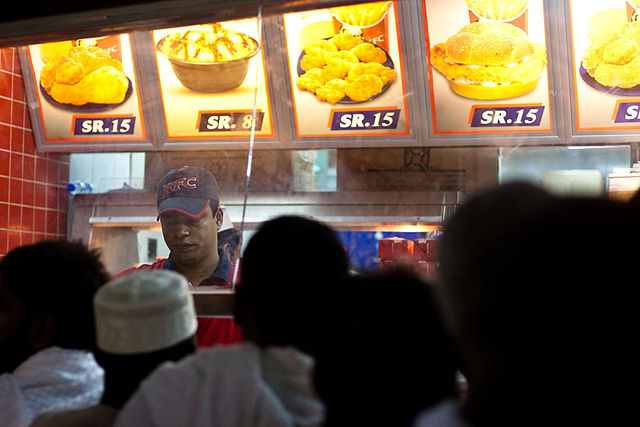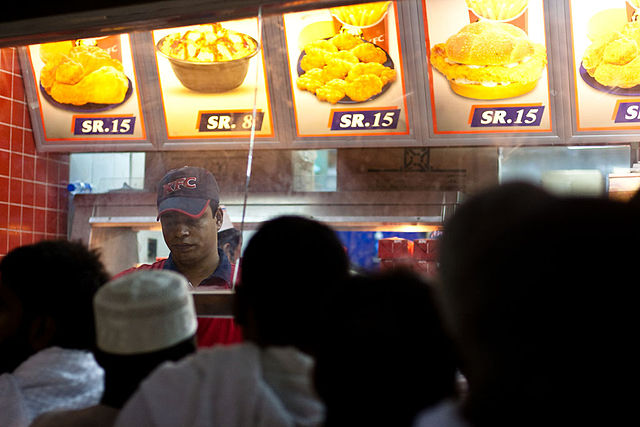
Omar Chatriwala of Al Jazeera English
The 5% tax will be applied to certain products in accordance with agreement on cooperation of the six Gulf countries, which was reached in June 2016.
Residents of the region have long enjoyed benefits of tax-subsidized life and existence, but crude oil prices collapse in 2014 led to mass layoffs and active search for new source of support.
Saudi Arabia is the world's largest oil exporter and the largest economy in the Arab Region. The country suspended major construction projects, cut salaries of the Cabinet’s members and froze wages of state employees to deal with a record budget deficit, which reached $ 97 billion in the last year.
The Kingdom is now trying to expand its investor base and increase non-oil revenues in an effort to diversify the economy. In addition, the Saudis seek to balance its budget by 2020.
The Cabinet decided to approve the agreement on a single value-added tax. This measure will be carried out by members of Cooperation Council for the Arab States of the Gulf, reported Saudi Press Agency. The Kingdom is also preparing its own royal decree. This has been taken in accordance with the IMF’s recommendations for the Persian Gulf countries. In particular, the organization suggests to raise excise taxes and introduce value added tax to help the local countries to adapt to the new market conditions.
Earlier, the Gulf countries agreed to introduce selective taxes on tobacco products, soft drinks and energy drinks.
OPEC’s agreement on production cuts has already called into question possible prospects for the cartel’s biggest producer.
During last few years, the Kingdom faced budget deficit for the first time in its recent history, collapse of oil prices, increased competition from other OPEC members, and boom of American shale companies.
Now, all attention has turned to the Kingdom’s plan called "Vision 2030". The strategy is meant to diversify the economy and put an end to dependence on oil and gas market.
In the short term, Riyadh will certainly continue to feel the pressure of low oil prices. Growth prospects for Saudi Arabia declined after the IMF announced on January 16 that the country’s GDP growth in 2017 will number just 0.4%.
These figures came amid continuing low oil prices, but, more important against the backdrop of falling oil production in the country after recently introduced oil freeze. This led to a reduction in GDP growth prospects as compared with a forecast of 2% in October.
This happened after weak growth in 2016, which resulted in the GDP growing by only 1.4%. If oil prices stabilize and improve the economic outlook, the country's GDP is likely to grow by 2.3% in 2018
Saudi Arabia called the IMF forecasts overly conservative. A government spokesman said that growth of Saudi Arabia will be less than 1%, referring to alleged investments in renewable energy sources and scheduled promotion of private sector.
source: guardian.co.uk
Residents of the region have long enjoyed benefits of tax-subsidized life and existence, but crude oil prices collapse in 2014 led to mass layoffs and active search for new source of support.
Saudi Arabia is the world's largest oil exporter and the largest economy in the Arab Region. The country suspended major construction projects, cut salaries of the Cabinet’s members and froze wages of state employees to deal with a record budget deficit, which reached $ 97 billion in the last year.
The Kingdom is now trying to expand its investor base and increase non-oil revenues in an effort to diversify the economy. In addition, the Saudis seek to balance its budget by 2020.
The Cabinet decided to approve the agreement on a single value-added tax. This measure will be carried out by members of Cooperation Council for the Arab States of the Gulf, reported Saudi Press Agency. The Kingdom is also preparing its own royal decree. This has been taken in accordance with the IMF’s recommendations for the Persian Gulf countries. In particular, the organization suggests to raise excise taxes and introduce value added tax to help the local countries to adapt to the new market conditions.
Earlier, the Gulf countries agreed to introduce selective taxes on tobacco products, soft drinks and energy drinks.
OPEC’s agreement on production cuts has already called into question possible prospects for the cartel’s biggest producer.
During last few years, the Kingdom faced budget deficit for the first time in its recent history, collapse of oil prices, increased competition from other OPEC members, and boom of American shale companies.
Now, all attention has turned to the Kingdom’s plan called "Vision 2030". The strategy is meant to diversify the economy and put an end to dependence on oil and gas market.
In the short term, Riyadh will certainly continue to feel the pressure of low oil prices. Growth prospects for Saudi Arabia declined after the IMF announced on January 16 that the country’s GDP growth in 2017 will number just 0.4%.
These figures came amid continuing low oil prices, but, more important against the backdrop of falling oil production in the country after recently introduced oil freeze. This led to a reduction in GDP growth prospects as compared with a forecast of 2% in October.
This happened after weak growth in 2016, which resulted in the GDP growing by only 1.4%. If oil prices stabilize and improve the economic outlook, the country's GDP is likely to grow by 2.3% in 2018
Saudi Arabia called the IMF forecasts overly conservative. A government spokesman said that growth of Saudi Arabia will be less than 1%, referring to alleged investments in renewable energy sources and scheduled promotion of private sector.
source: guardian.co.uk


















